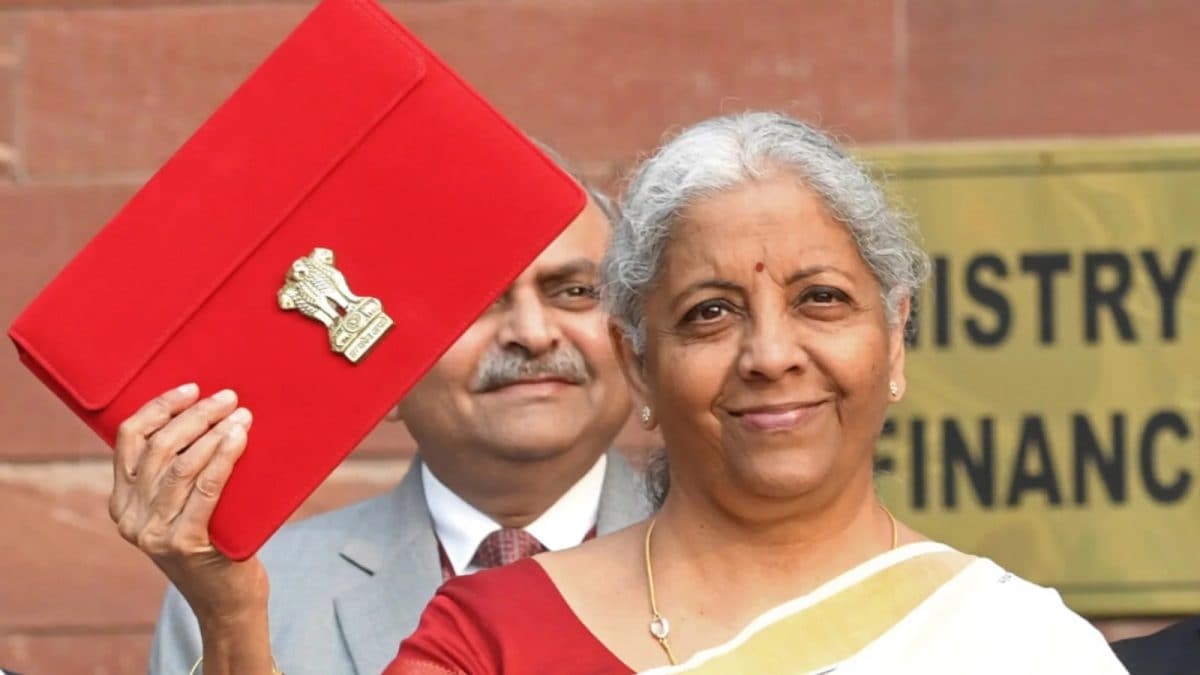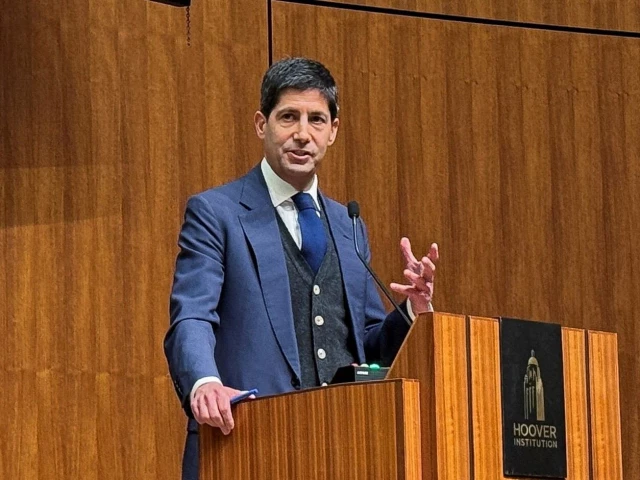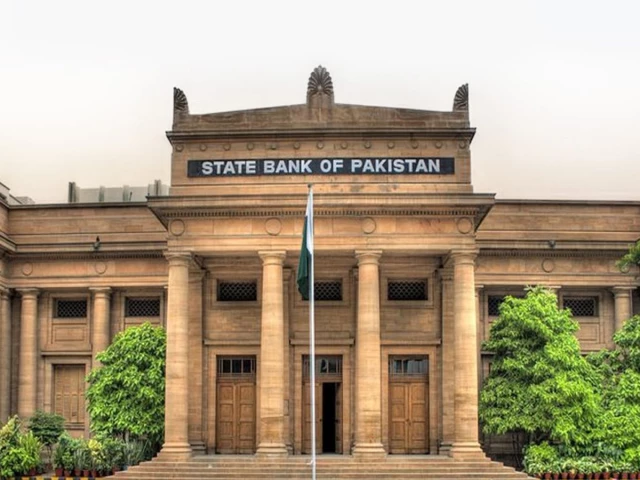Business
RFK Jr. spreads vaccine misinformation during congressional testimony

U.S. Health and Human Services Secretary Robert F. Kennedy Jr., testifies before a Senate Finance Committee hearing on President Donald Trump’s 2026 health care agenda, on Capitol Hill in Washington, D.C., U.S., September 4, 2025.
Jonathan Ernst | Reuters
Health and Human Services Secretary Robert F. Kennedy Jr. doubled down on false claims about vaccines during his Senate testimony on Wednesday, as senators grilled him on his sweeping changes to immunization policy and federal health agencies.
Kennedy said he supports a statement made by a newly appointed member of a key government vaccine panel that mRNA vaccines pose a dangerous risk to people. Numerous studies have demonstrated that shots using mRNA technology, including Covid vaccines from Pfizer and Moderna, are safe and effective, and serious side effects have happened in extremely rare cases.
Sen. Michael Bennet, D-Colo., noted that the committee member Dr. Retsef Levi has said that evidence is mounting that mRNA vaccines cause “serious harm, including death, especially among young people,” apparently referring to a post pinned on Levi’s X account. Kennedy appointed Levi to the Advisory Committee on Immunization Practices, which advises the Centers for Disease Control and Prevention on vaccine recommendations and insurance coverage.
Kennedy said he wasn’t aware of Levi’s comments, but added, “I agree with it.”
Kennedy’s comments before the Senate Finance Committee come after he repeatedly promised the panel in January that he would do nothing as HHS secretary that makes it more difficult or discourages people from taking vaccines. Since then, he has canceled funding for mRNA shot development and made other vaccine policy changes that could limit access to immunizations, including gutting the CDC vaccine panel and dropping Covid shot recommendations for certain groups.
His comments also follows a leadership shakeup at the Centers for Disease Control and Prevention. The White House last week fired CDC Director Susan Monarez, and four senior agency officials resigned shortly after, with some of them citing the politicization of the agency and a threat to public health. In an opinion piece on Thursday, Monarez accused Kennedy of “a deliberate effort to weaken America’s public-health system and vaccine protections.”
Kennedy touted skepticism around Covid vaccines, despite evidence of their safety and effectiveness.
“We were told again and again the vaccines would prevent transmission, they prevent infection. It wasn’t true. They knew it from the start,” Kennedy said.
He also said he does not know how many people died of Covid and whether the vaccines prevented deaths from the virus.
“I would like to see the data and talk about the data,” Kennedy said.
But data is readily available from dozens of studies. One paper in August estimates that Covid vaccines saved more than 2 million lives, mostly among older adults, worldwide between 2020 and October 2024.
The CDC website also says that Covid vaccines from the 2023 to 2024 season reduced the risk of severe illness from Covid by almost 70% in the first two months after vaccination in adults ages 18 and older, with protection gradually decreasing over time.
Those shots also decreased the risk of hospitalization due to Covid by around 50% in the first two months of vaccination in that same population. The Covid vaccines showed similar benefits in older adults.
Kennedy also defended his decision to fire all 17 previous members of the CDC vaccine panel, saying he didn’t politicize the committee.
“What we did is we got rid of the conflicts of interest. … We depoliticized and put great scientists on it from a very diverse group,” the HHS secretary said. “They are very, very pro-vaccine.”
But a new analysis published last month from USC researchers found that conflicts of interest on that panel had been at “historic lows for years” before Kennedy restacked it with new members, some of whom are widely known vaccine critics.
Business
Buying property from NRIs? Time to lose the TAN – The Times of India

Buying property from an NRI? Worried about obtaining TAN? Not anymore. To relax the compliance burden, the Budget has proposed that resident individuals and HUFs need not have a Tax Deduction and Collection Account Number (TAN) if they are purchasing a property from a non-resident Indian (NRI). The amendment will take effect from Oct 1, 2026.Under the proposed framework, resident individuals or HUFs can report the tax deducted at source (TDS) by quoting PAN, as is done when the transactions are between two residents. Presently, if a person buys an immovable property from a resident seller, the person is not required to obtain TAN to deduct tax at source. However, where the seller of the immovable property is a non-resident, the buyer is required to obtain TAN to deduct tax at source.Ameet Patel, partner at Manohar Chowdhry & Associates, said this used to be a detailed process. “At present, if a resident were to purchase an immovable property from an NRI, there is no separate relaxation regarding compliance with TDS responsibilities. As a result, in such cases, the buyer needs to obtain a TAN, register on the portal, and then deduct TDS u/s. 195, and pay to the govt. Under section 195, as with all other regular TDS sections, a quarterly e-TDS statement is required. A buyer would need professional help for all this.”Hinesh Doshi, CA, welcomed the move. “There used to be an unnecessary compliance burden due to this. While the process to obtain TAN is simple, people used to obtain TAN for just one transaction. So, this is a good riddance.”
Business
Harry Styles and Anthony Joshua among UK’s top tax payers

The former One Direction member-turned-solo artist appears on the Sunday Times list for the first time.
Source link
Business
From Manufacturing To Infra And AI: Capex Boost Flags Off Budget 2026 ‘Reforms Express’

Last Updated:
Budget 2026: FM Nirmala Sitharaman gives a strong push to manufacturing, infrastructure and job creation, while proposing a simpler tax and customs system.

Finance Minister Nirmala Sitharaman presents the Union Budget 2026-27.
Budget 2026 Takeaways: Finance Minister Nirmala Sitharaman on Sunday presented the Union Budget 2026-27, giving a strong push to manufacturing, infrastructure and job creation, proposing a simpler tax and customs regime, and hailing the government’s modernisation drive as a “reforms express”.
The Budget 2026 is anchored around three ‘kartavyas’ — driving growth by enhancing productivity and competitiveness, building people’s capacity, and ensuring inclusive development under the vision of Sabka Saath, Sabka Vikaas.
In her ninth consecutive Budget in Parliament, Sitharaman laid out a multi-pronged strategy to sustain growth amid global uncertainty, including expanding domestic electronics and semiconductor capabilities, de-risking infrastructure projects, skilling India’s youth for emerging technologies, and easing compliance for taxpayers and importers.
Here are the key takeaways from Budget 2026 across manufacturing, infrastructure, skills, AI, taxation and customs duty.
Manufacturing Gets A Boost
Budget 2026 put a special emphasis on the manufacturing landscape in India. The outlay for electronics components manufacturing was raised sharply to Rs 40,000 crore, while new schemes for rare earth magnets, chemical parks, container manufacturing and capital goods seek to reduce import dependency, and strengthen domestic supply chains. Textiles got an integrated, employment-oriented package covering fibres, clusters, skilling and sustainability.
Infrastructure-Led Growth
Infrastructure got a boost with a higher capex allocation and initiatives like a risk guarantee fund to de-risk projects for private developers, new dedicated freight corridors and national waterways, dedicated REITs (real estate investment trusts) for recycling of significant real estate assets of central public sector enterprises (CPSEs), and a seaplane VGF (viability gap funding) scheme.
The Centre’s capital expenditure (capex) target has been increased to Rs 12.2 lakh crore for FY27, up from Rs 11.2 lakh crore earmarked for the current financial year. Moreover, maintaining the fiscal discipline, Sitharaman said the government expects the fiscal deficit to be at 4.3 per cent of the GDP in 2026-27, lower than 4.4 per cent projected for the current financial year.
Tier-II and Tier-III cities were placed at the centre of urban growth via City Economic Regions, backed by reform-linked funding.
“We shall continue to focus on developing infrastructure in cities with over 5 lakh population (Tier II and Tier III), which have expanded to become growth centres,” Sitharaman said in her Budget Speech.
Greater Emphasis On Skilling
The Budget placed renewed emphasis on the services economy as a jobs engine. A high-powered Education-to-Employment and Enterprise Committee will realign skilling with market needs, including the impact of emerging technologies.
Content creation and creative industries get a boost through AVGC labs in schools and colleges, support for animation, gaming and comics, and new institutional capacity for design and hospitality. Tourism-linked skilling, from guides to digital heritage documentation, signals a clear intent to convert culture and content into employment and exports.
“I propose to support the Indian Institute of Creative Technologies, Mumbai in setting up AVGC Content Creator Labs in 15,000 secondary schools and 500 colleges,” FM Sitharaman said. AVGC stands for animation, visual effects, gaming and comics.
AI & Semiconductors Push
Artificial intelligence (AI) was positioned as a cross-sector force multiplier rather than a standalone theme. The Budget provided a push to artificial intelligence (AI) by promoting adoption with governance, agriculture, education and skilling, including proposals for AI-enabled advisory tools for farmers and AI integration in education curricula.
On hardware, the semiconductor strategy expanded decisively under ISM 2.0 (India Semiconductor Mission 2.0), with focus on domestic equipment manufacturing, materials, research centres and workforce development, signalling a long-term commitment to building a resilient chip ecosystem in India.
Taxation, ITR, TDS, TCS
A major structural reform comes with the Income Tax Act, 2025, effective April 1, 2026, containing simpler rules and redesigned forms.
Budget 2026 provided compliance relief for individuals, including extended timelines for revising returns to March 31 from December 31 earlier, staggered ITR due dates, and easier filing of Form 15G/15H through depositories.
Individuals with ITR-1 and ITR-2 returns will continue to file till July 31, and non-audit business cases or trusts are proposed to be allowed time till August 31, according to the Budget Speech 2026-27.
“I propose to extend time available for revising returns from 31st December to up to 31st March with the payment of a nominal fee. I also propose to stagger the timeline for filing of tax returns. Individuals with ITR 1 and ITR 2 returns will continue to file till 31st July and non-audit business cases or trusts are proposed to be allowed time till 31st August,” Sitharaman said.
TDS (Tax deducted at source) rules were clarified for manpower services, while a rule-based system for lower or nil TDS certificates is proposed. TCS rates were cut to 2% for overseas tour packages, education and medical expenses under liberalised remittance scheme (LRS). Litigation is targeted through integrated assessment and penalty orders, lower pre-deposit requirements, and wider immunity provisions.
TDS on the sale of immovable property by a non-resident will be deducted and deposited through resident buyer’s PAN (Permanent Account Number)-based challan instead of requiring TAN (Tax Deduction and Collection Account Number), Sitharaman said.
Customs Duty Tweaks
Customs duty rationalisation continued with a clear focus on domestic manufacturing, energy transition and ease of living. Exemptions have been extended or introduced for capital goods used in lithium-ion batteries, critical minerals processing, nuclear power projects and aircraft manufacturing.
Personal imports will become cheaper with a reduction in duty on goods for personal use from 20% to 10%. Seventeen cancer drugs and additional rare-disease treatments were exempted from customs duty. Process reforms aimed at trust-based, tech-driven clearances, faster cargo movement and lower compliance costs, especially for exporters and MSMEs (micro, small, medium and enterprises).
STT On F&O Hiked
The Budget increased securities transaction tax (STT) on futures trading from 0.02% to 0.05% and on options trading from 0.10% to 0.15%, a move that upset the capital markets with the BSE Sensex crashing more than 2,300 points from the day’s high and the NSE Nifty dropping to 24,571.75.
Securities Transaction Tax (STT) is a direct tax imposed on the buying and selling of securities in India.
Commenting on the Budget, Prime Minister Narendra Modi said, “The Union Budget reflects the aspirations of 140 crore Indians. It strengthens the reform journey and charts a clear roadmap for Viksit Bharat.”
February 01, 2026, 14:43 IST
Read More
-

 Sports5 days ago
Sports5 days agoPSL 11: Local players’ category renewals unveiled ahead of auction
-

 Tech1 week ago
Tech1 week agoThis Mega Snowstorm Will Be a Test for the US Supply Chain
-

 Entertainment5 days ago
Entertainment5 days agoClaire Danes reveals how she reacted to pregnancy at 44
-

 Fashion1 week ago
Fashion1 week agoSpain’s apparel imports up 7.10% in Jan-Oct as sourcing realigns
-

 Sports5 days ago
Sports5 days agoCollege football’s top 100 games of the 2025 season
-

 Tech1 week ago
Tech1 week agoICE Asks Companies About ‘Ad Tech and Big Data’ Tools It Could Use in Investigations
-

 Fashion1 week ago
Fashion1 week agoTurkiye cuts benchmark rate to 37%, flags confidence on inflation
-

 Fashion1 week ago
Fashion1 week agoAustralian wool prices climb again as exporters drive demand












